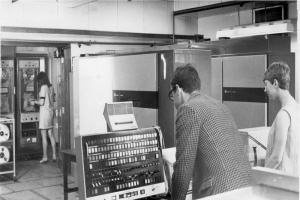Atlas supercomputer celebrates half a century
03 Dec 2012
Scientists and engineers return for two days of events

Scientists who worked on one of the world’s first supercomputers will gather this week to mark its 50th anniversary.
Developed at The University of Manchester between 1956 and 1963, the Atlas computer was at the time the most powerful in the world.
The first production Atlas was inaugurated at the University on 7 December 1962 by Sir John Cockcroft, the Nobel prize-winning physicist who was Director of the UK’s Atomic Energy Authority.
Scientists and engineers who worked on the Atlas will attend the celebrations tomorrow (Tuesday 4 December) and Wednesday, which will include demonstrations of the 1948 Manchester Baby – the world’s first stored-program computer currently housed at the Museum of Science and Industry – an exhibition of Atlas artefacts, talks by pioneers and presentations on current Computer Science research.
Among the attendees will be a number of people who used the Atlas computer during their studies at the University in the 1960s.
The aim of the Atlas was to build a computer that could operate at processing speeds approaching one microsecond per instruction, about one million instructions per second.
It was claimed that when Atlas went offline, half of the UK’s computing capability was lost.A total of six Atlas 1 and Atlas 2 computers were delivered between 1962 and 1966.
Professor Simon Lavington, who started using Atlas as a research student in 1962, said: “The Atlas event will bring together, probably for the last time, a unique group of industrialists, academics and end-users who contributed to a world-class project which brought a huge increase of computing power to the UK’s scientific community in the 1960s”.
Professor Steve Furber, ICL Professor of Computer Engineering, said: “Atlas was in many ways the most remarkable of all of the machines designed at Manchester.
“Fifty years later, the concept of single-level store – what we now call virtual memory – is vital to the operation of everything from smart phones to supercomputers, and we owe that idea to the Atlas designers.
“Manchester built the world's first stored program computer, the Baby, in 1948, but it's important to remember that that wasn't our only contribution. Atlas was spectacularly fast for its day and highly innovative, and we are still building exciting new machines here to this day.”
- Special demonstrations of the 1948 Manchester Baby (the world’s first stored-program computer) and a display of Atlas archives are open to the public at the Museum of Science and Industry (MOSI) in Castlefield from 11am to 3.30pm tomorrow (Tuesday 4 December).
